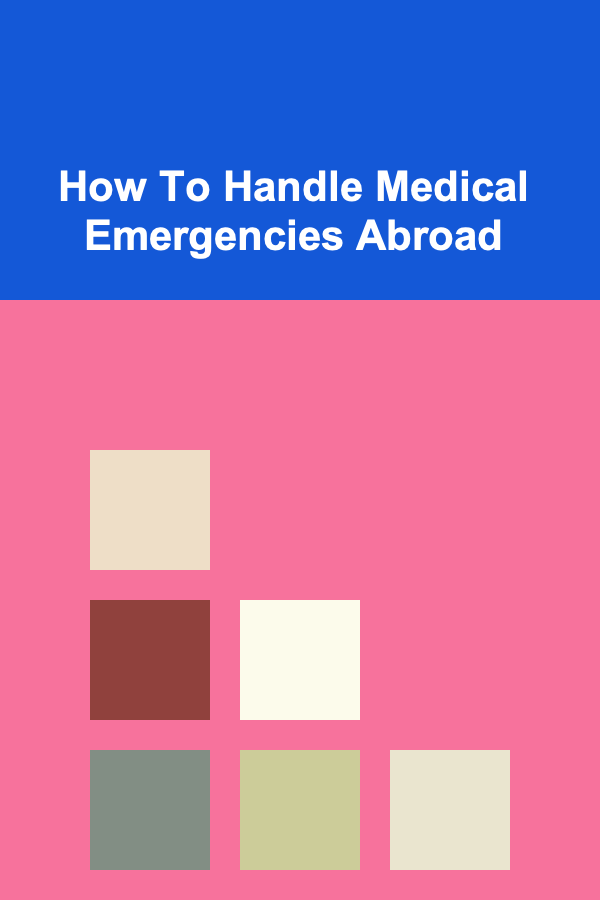
How To Handle Medical Emergencies Abroad
ebook include PDF & Audio bundle (Micro Guide)
$12.99$9.99
Limited Time Offer! Order within the next:

Traveling abroad can be one of the most exciting experiences of your life. Whether it's for a vacation, business, or an educational journey, venturing into new cultures, exploring beautiful landscapes, and immersing yourself in different lifestyles are all part of the adventure. However, what happens when a medical emergency occurs while you're far from home? Understanding how to handle medical emergencies abroad is crucial for ensuring your safety and well-being in unfamiliar environments.
In this article, we will discuss the essential steps to take in case of a medical emergency abroad, how to prepare for unexpected health incidents before your trip, and what to do during and after the emergency. From securing travel insurance to knowing how to communicate with medical professionals, this guide will provide comprehensive insights on navigating medical emergencies in foreign countries.
Pre-trip Preparation: How to Be Ready for Medical Emergencies Abroad
The best way to handle a medical emergency abroad is to prevent it from becoming a catastrophe. Preparation is the key to ensuring you stay safe and are ready to handle any health issues that may arise. Here are the essential things you need to do before you leave for your trip.
1. Purchase Travel Insurance with Health Coverage
Medical expenses can be exorbitant in some countries, especially if you don't have proper health insurance coverage. In many cases, your regular domestic health insurance may not cover medical costs abroad, so it's critical to purchase travel insurance that includes health coverage.
When choosing a travel insurance plan, ensure that it covers:
- Medical emergencies, including hospital visits, doctor consultations, and surgeries.
- Evacuation coverage, which includes emergency evacuation if you need to be transported to a better-equipped hospital, especially in remote areas.
- Repatriation of remains in the unfortunate event of death.
- Trip cancellation and other travel-related issues due to medical emergencies.
Do some research and choose a plan that suits your destination, activities, and health conditions.
2. Carry Essential Medical Information
Before your trip, compile a comprehensive list of your medical information and ensure it's easily accessible. This list should include:
- Prescription medications you are currently taking, including the name, dosage, and purpose of each.
- Allergies, especially to food, medications, or environmental factors.
- Chronic conditions you may have, such as diabetes or heart disease, so that foreign medical professionals can offer appropriate treatment.
- Emergency contacts of your family or primary care physician.
If you have chronic conditions, make sure to carry a doctor's note that explains your condition and the necessary treatment. This can be extremely useful in case of an emergency.
3. Understand the Health Care System of Your Destination
Different countries have different healthcare systems, so it's crucial to understand what to expect before an emergency arises. Research the health care system in your destination country, including:
- The availability of quality medical care.
- Whether there are international hospitals or medical facilities that cater to tourists or foreigners.
- If you need to pay for healthcare upfront, or if health services are billed directly to your insurance.
- How to access emergency medical services (e.g., emergency numbers or direct contacts with local health authorities).
Having a general idea of how health care works in the country you're visiting can significantly reduce stress if you need medical attention.
4. Prepare a Travel Health Kit
Having a travel health kit with essential supplies can make a huge difference in handling minor medical issues, such as cuts, colds, or headaches. Your health kit should include:
- Over-the-counter medications like pain relievers, antihistamines, and anti-diarrheal medicines.
- Band-aids, antiseptics, and gauze for treating cuts and scrapes.
- Insect repellent, sunscreen, and any other items specific to your destination (such as malaria prevention).
- A thermometer and any other tools that might help you manage basic health concerns.
This kit can be especially helpful if you're traveling to a remote area where medical facilities are scarce.
What to Do in the Event of a Medical Emergency Abroad
Even with the best preparation, medical emergencies can still occur. Here are the essential steps you should take if you or someone you're with faces a medical emergency abroad.
1. Assess the Situation Calmly
In any medical emergency, staying calm is key to making sound decisions. Panicking or rushing through the situation can lead to mistakes or complications. Take a moment to assess the emergency:
- Is it a life-threatening situation (e.g., severe bleeding, heart attack, stroke)?
- Is the person conscious and able to communicate?
- Are there immediate dangers like environmental factors (e.g., extreme heat or cold) that need to be addressed first?
Once you have a clear understanding of the situation, you can move forward with the appropriate response.
2. Seek Local Emergency Services
The next step is to contact local emergency services. Every country has a different emergency number for situations like medical crises or accidents. Knowing this number ahead of time is critical. In many European countries, the emergency number is 112, while in the United States, it is 911.
You can also ask your hotel's front desk or locals for directions to the nearest hospital or clinic if the situation is not immediately life-threatening.
3. Use Your Travel Insurance for Assistance
Once you've contacted emergency services, it's important to call your travel insurance provider. Most travel insurance companies offer 24/7 emergency assistance, which can be invaluable in a foreign country. They can guide you to the nearest hospital, arrange transportation, and even help you communicate with medical personnel if there's a language barrier.
Many travel insurance providers also have partnerships with hospitals around the world. If you have the insurance company's number handy, you can get fast, professional advice on what to do next.
4. Communicate Your Medical Needs Clearly
Language barriers can make communication difficult during medical emergencies abroad. It's important to clearly communicate your medical needs and history to healthcare providers. If possible, try to speak in the local language, or use translation apps to explain your symptoms. Carrying a medical phrasebook or a pre-written emergency card that explains your condition can also help.
In addition, always inform the medical staff of any existing medical conditions, allergies, and medications you're taking. This information can be crucial in ensuring you receive the correct treatment.
5. Follow Medical Advice and Continue Monitoring
Once you receive medical care, make sure to follow all medical instructions carefully. Take prescribed medications as directed, and ensure you're clear on follow-up care if necessary. Don't hesitate to ask for clarification if something is unclear.
Keep track of your symptoms and communicate any changes to the medical staff. If your condition worsens, don't hesitate to seek additional treatment.
Post-Emergency: What to Do After a Medical Emergency Abroad
Once the immediate medical emergency has passed, there are several steps you should take to ensure your recovery and well-being, as well as manage any potential follow-up care.
1. Notify Your Family and Emergency Contacts
After receiving treatment, make sure to contact your family and inform them of the situation. If you are traveling alone, contact your emergency contacts or family to let them know that you are safe and receiving the appropriate care.
If you are traveling with a group or family, keep everyone informed about the situation and the steps you are taking.
2. Get the Necessary Documentation
After treatment, ask for medical documentation that outlines the care you received. This can be essential for insurance claims or for continuity of care when you return home. Medical records can also help doctors back home provide the right treatment if necessary.
Ensure that you keep all receipts, prescriptions, and documents related to the medical emergency for reimbursement purposes from your travel insurance.
3. Follow Up with Your Regular Doctor
If you require ongoing care or medication, make an appointment with your doctor back home to ensure continuity of care. Share your medical records from the emergency treatment, and follow up on any prescriptions or advice provided by the healthcare providers abroad.
If you need medical care upon your return, ensure that your doctor is fully informed of the care you received while abroad.
4. File Your Insurance Claim
After returning home and making sure that you've received all necessary medical care, it's time to file your insurance claim. Depending on your insurance provider, you may need to submit forms, medical records, and receipts to receive reimbursement for your expenses.
Be prepared to follow up on your claim if there are delays or complications in processing.
Conclusion
Handling a medical emergency abroad can be challenging, but with proper preparation and knowledge, you can navigate the situation effectively. Prioritize your health by purchasing adequate travel insurance, carrying essential medical information, and understanding the healthcare system in your destination country. When an emergency arises, remain calm, seek local assistance, and communicate clearly with medical professionals. Afterward, ensure that you follow up on any necessary care and file the appropriate insurance claims.
With the right approach, you can mitigate the risks of medical emergencies abroad and continue to enjoy your travels with peace of mind. Safe travels!

Becoming a Successful Market Research Analyst: Essential Skills for Understanding Consumer Behavior
Read More
Building Scalable Networks: Techniques and Tools for Network Administrators
Read More
How to Refresh Your Home Using Budget-Friendly Seasonal Decor
Read More
How to Set Up a Productive Home Office for Remote Work
Read More
How to Throw an Elegant Dinner Party at Home on a Budget
Read More
Passive Income Ideas for Deep Learning Enthusiasts
Read MoreOther Products

Becoming a Successful Market Research Analyst: Essential Skills for Understanding Consumer Behavior
Read More
Building Scalable Networks: Techniques and Tools for Network Administrators
Read More
How to Refresh Your Home Using Budget-Friendly Seasonal Decor
Read More
How to Set Up a Productive Home Office for Remote Work
Read More
How to Throw an Elegant Dinner Party at Home on a Budget
Read More